Is Sean Dyche right to 'question this idea of player welfare'?

Sean Dyche and the £10.6 Barnfield Training Centre, which opened in 2017
Written by Simon Austin — January 1, 2022
WITH a congested fixture list and Covid-depleted squads, player welfare has been the hot topic of the Christmas period.
Jordan Henderson has said he doesn’t think anyone takes the topic seriously. Thomas Tuchel, among others, has called for the introduction of five substitutes instead of three in the Premier League.
Ralf Rangnick has questioned why there are still two cup competitions in England, and Pep Guardiola has raised the prospect of a players' strike should things remain the same.
Not for the first time, Burnley boss Sean Dyche has provided a compelling counterpoint to the complaints of the biggest teams. Speaking before his side’s 3-1 defeat by Manchester United on Thursday night, he said: “I keep hearing this term 'player welfare'. I’ve got to be honest, my players here, I think the welfare is absolutely fantastic, the way they’re looked after.
“Although there are a lot of demands in football, particularly for the superpower teams - they’re often so successful they’re in all cups, they’re in Europe and pushing for the league - but for ourselves, the players here, we’ve got strength and conditioning, psychology support, health and wellbeing, dieticians, a lot of players now have home chefs.
“I think the health and wellbeing is the top of the list and I think we do that well here. You add in then the challenge of Covid - we’ve given them (the players) all the information, we’re trying to stand by the rules as best as we possibly can.
“So it does make me question this idea of player welfare. I think the players have got to be careful themselves, because the welfare is off the scale for me personally. I look at eras gone by. The Christmas period has always been busy and in fact has actually got less busy down the years and the Premier League has attempted to spread games out.
“Frank Lampard, season after season, was knocking out 60-odd games and then England games on top. Season after season after season after season. I don’t remember too much then about player welfare being spoken about.
“There still has be a root inside you of what your beliefs are in football and go, 'Come on, let’s get on with the challenge.' Let’s remember what we are, we’re professional athletes, we’re professional footballers, so whatever comes our way, whatever challenge it is, we’ll take it on and do the best we can with it.”
HOW DO THE ARGUMENTS STACK UP?
Like most Premier League teams, Burnley's backroom staff has grown significantly in recent seasons (although it’s still smaller than many). Mark Howard heads up the performance department and has a Lead Strength and Rehab Coach (Chris Wilding), two performance coaches (Mike Goulden and Matt Challoner) and a performance nutritionist (Elliot Frankland), who Dyche was referring to in his press conference.
In the summer, the club also advertised for a clinical psychologist, and TGG understands they are about to interview for this position, having recently compiled a shortlist of candidates. Dr Allan Johnston was doing the job on a consultancy basis up until this summer.
The club's training facilities are also first-class. In the summer of 2017, the Clarets opened their new £10.6m Barnfield Training Centre, complete with three full-sized pitches (including a heated Desso one), two three-quarter sized pitches, an indoor pitch, hydrotherapy treadmill and hot and cold plunge pools.
Dyche was right that Lampard was putting together huge numbers of matches for Chelsea and England, season upon season, in a way that we don't see today. For four consecutive seasons, from 2003/04 to 2006/07, the midfielder played more than 60 games. In fact in 2003/04 and 2005/07 he played 70 or more.
Burnley's boss did acknowledge that the top teams, like Manchester City, Liverpool and Chelsea, face different demands from his own because of the number of fixtures they face, both domestically and in Europe.
However, there was one counterpoint he didn’t mention - namely that the game is different today than it was 15 years ago, with different physical demands. Football - particularly in the Premier League and especially for the top teams - has become a game of repeated high-intensity sprints.
In 2019, former Manchester United and England defender Gary Neville told TGG: “These players today… they’re all running 13, 14km a match, some of them are running 1500m at high intensity and 20 years ago Gary Neville and his team-mates weren’t doing that.
"That’s why I retired, because I was seeing it in front of my own eyes, that I couldn’t get to that level any more.”
Of the major European leagues, the Premier League is out on its own when it comes to intensity, sprinting and overall volume (high-intensity distance and average total distance), as this article by Skill Corner, who derive tracking data from broadcast feeds, for TGG in August 2020 explained.
If we look at sprinting data for last season (average number of sprints per match and team sprint distance), Leeds United were out on their own for both metrics, with Liverpool, Chelsea, Manchester City, Manchester United and Southampton in the next cluster of leading clubs.
Burnley were among the bottom four clubs for both metrics. For average high-intensity metres per minute (defined as the distance covered above 5.5m per second) the Clarets were actually second though (with Leeds again top).
Hopefully this provides some context to the debate - with thanks to Dyche, once again, for providing an alternative view to the consensus of the top teams.







-1.png)





